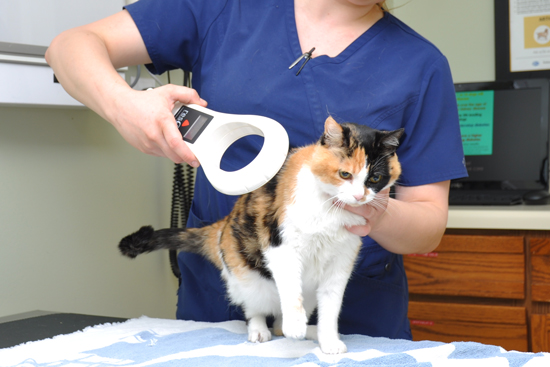Oh no! The American Society for the Prevention of Cruelty to Animals (ASPCA) reported that only 33% of pet parents admitted to always having ID tags on their dogs and cats. One in three pets will get lost at least once in their lifetime and only 22% of lost pets that enter animal shelters are reunited with their families.
So what can you do to help your family not suffer a heartbreak from a lost pet? Keep current ID tags on them at all times and have them microchipped by a veterinarian. Your pet’s ID tag should include:
-
- Pet’s name
- Owner’s name and address (if comfortable disclosing)
- Telephone numbers (day and evening)
- Any medical problem requiring medication (may require separate tag)
- Veterinarians name and number, if possible (included on rabies tag)
- Reward offer (optional)
Collars with ID tags are accessible to anyone, but can become hard to read, broken or removed. Microchipping your pet is a method of permanent identification. A rice-sized microchip is injected under your pet’s skin similar to when your pet receives vaccinations by a veterinarian. It is a quick, near-painless procedure that does not require anesthesia.Each microchip contains a unique number that belongs to your pet.
 You register your pet’s unique number with a national pet recovery database. When your pet becomes lost, shelters and veterinarians scan your pet for a microchip using a universal scanner. The scanner detects your pet’s unique number and then the shelter or animal clinic calls the national registry. But do not worry – the microchip does not store your personal information and the registry keeps this information secure in their databases. Your contact information is not shared with anyone and only the agency will contact you directly. Take these few easy steps to help ensure your pet is reunited with you if ever lost. We invite you to make an appointment at Your Family Veterinarian so we can help keep your pet safe.
You register your pet’s unique number with a national pet recovery database. When your pet becomes lost, shelters and veterinarians scan your pet for a microchip using a universal scanner. The scanner detects your pet’s unique number and then the shelter or animal clinic calls the national registry. But do not worry – the microchip does not store your personal information and the registry keeps this information secure in their databases. Your contact information is not shared with anyone and only the agency will contact you directly. Take these few easy steps to help ensure your pet is reunited with you if ever lost. We invite you to make an appointment at Your Family Veterinarian so we can help keep your pet safe. 

